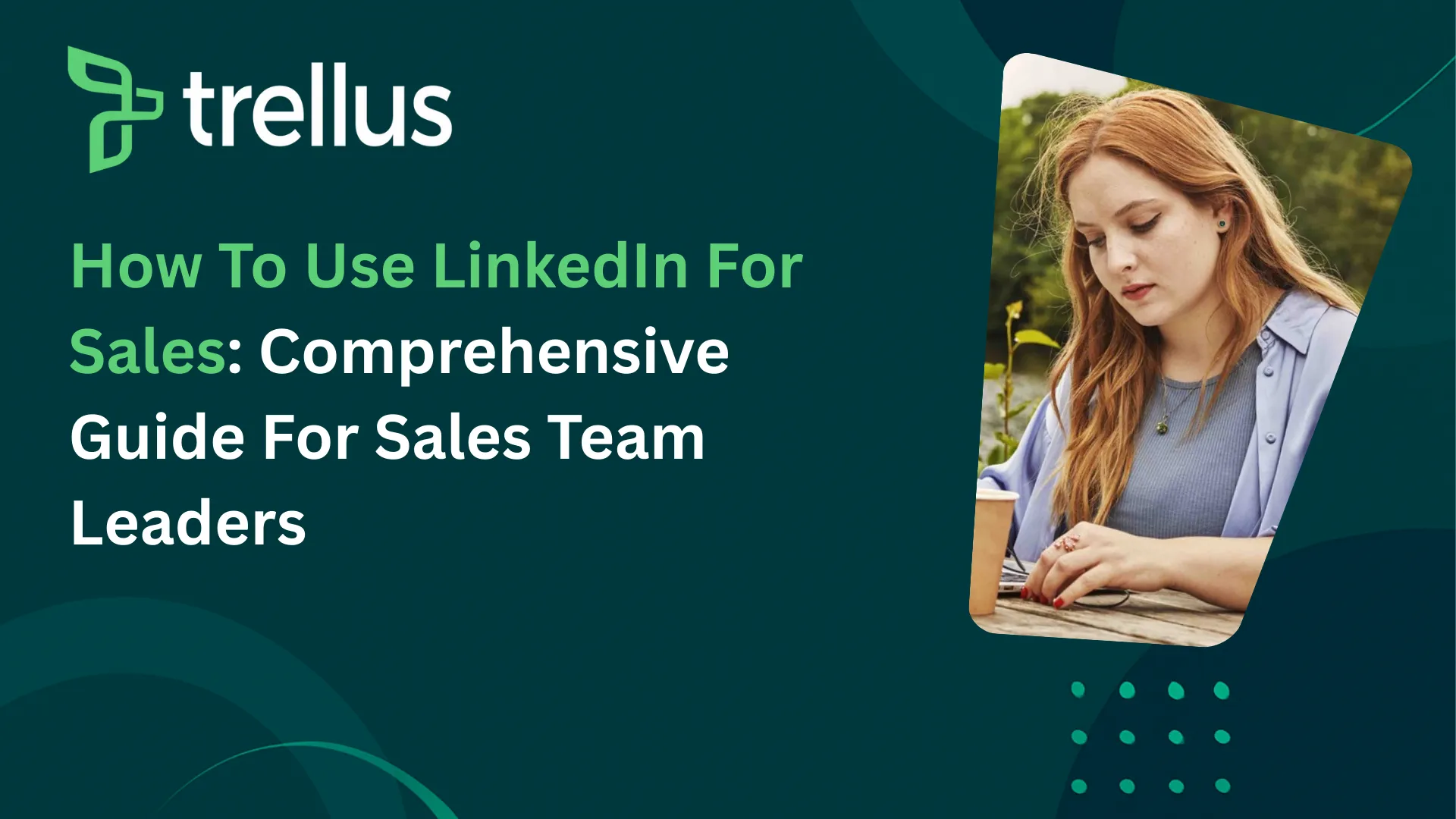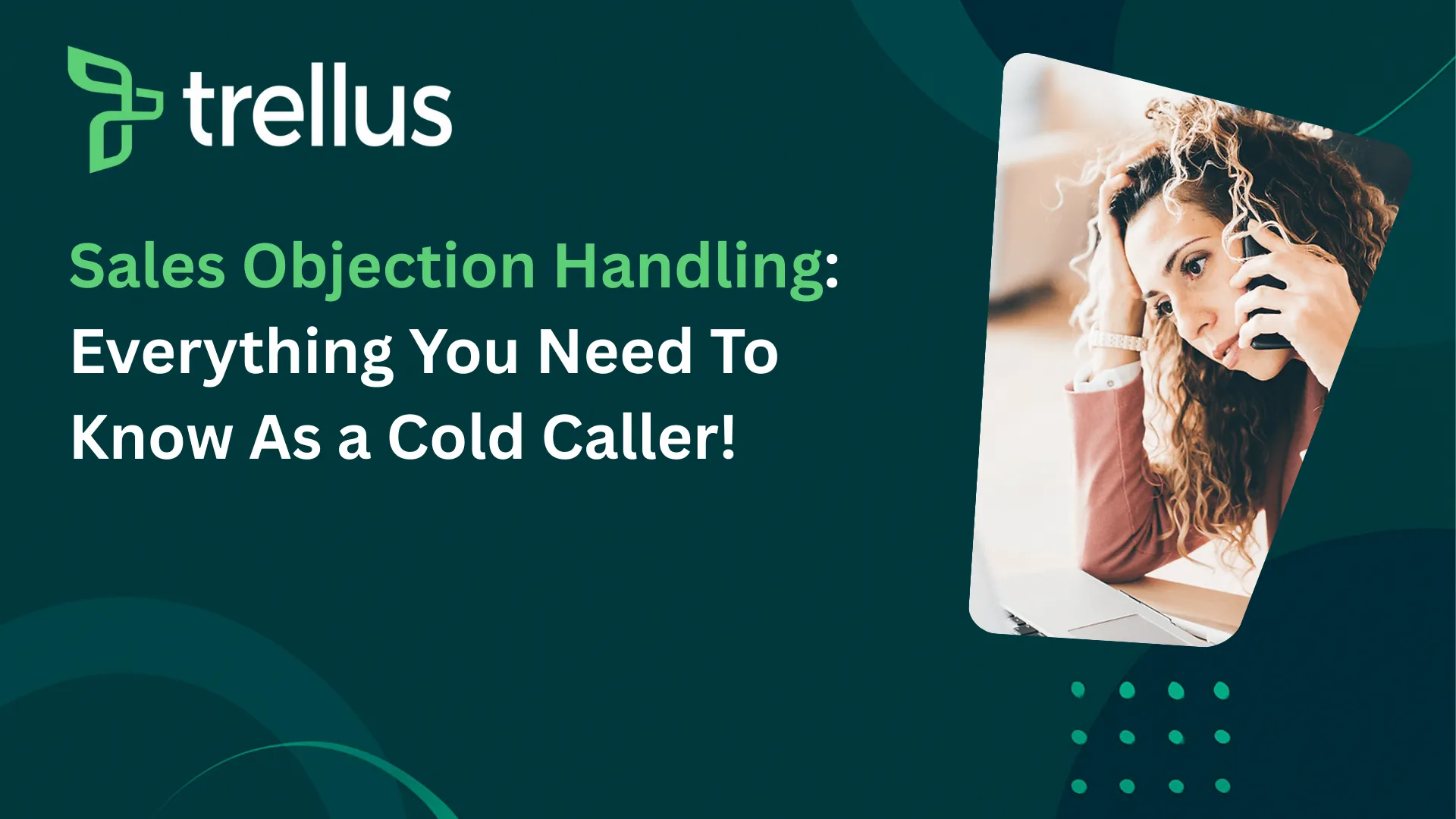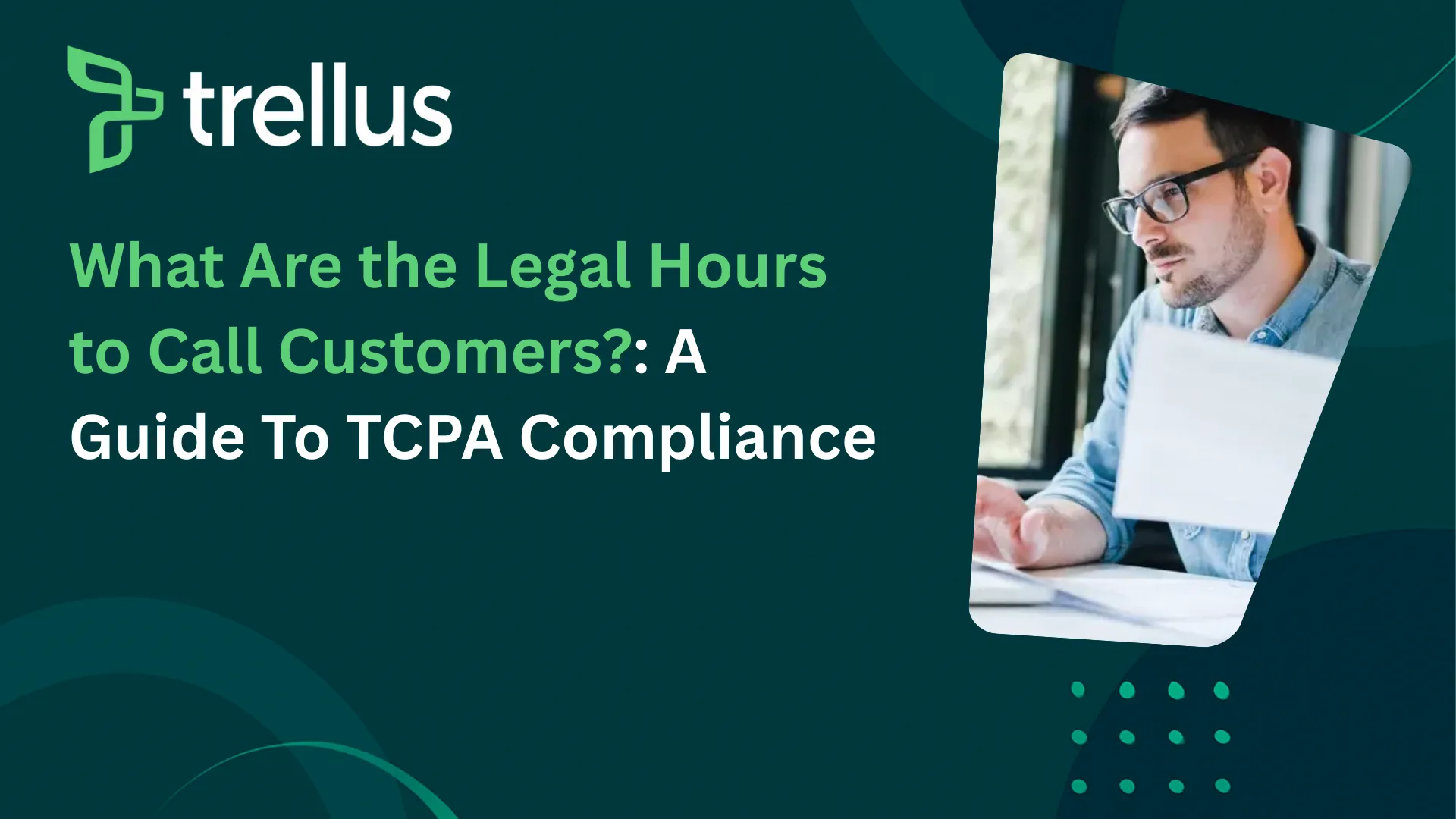
Our Top Picks


Reaching out to potential customers and even prospects with whom you have no prior contact at the wrong time isn’t just frustrating—it can land your business in serious legal trouble.
If you weren’t aware of the Telephone Consumer Protection Act (TCPA) by now, you should look it up online, especially if you happen to run a sales business that relies on day-to-day cold calls.
Why so?
The Federal law sets clear limits on when businesses can pick up the phone. At its core, the rule is simple: you may only call between 8 AM and 9 PM in the customer’s local time zone. Basically, these policies and rules were set to protect the consumer, and the potential customer, or prospects, who are ordinary people like everyone around you.
Over time, as the culture of robo and automated calls grew, so did the TCPA’s governing authorities’ new policies.
They became more widespread at the sublevel and more detailed, too.
The latest version of the TCPA guidelines, as some people like to call it, comes with different policies associated with:
- Consent requirements
- State-specific restrictions
- Technology rules are shaping what’s allowed and what’s not allowed anymore these days.
That being said, for sales businesses that aren't well aware of the TCPA and how to make more sales and conversions while staying compliant, this post details a full breakdown of what you need to do.
Read on…
Understanding the Legal Business Calling Times: Federal Rules
What is the Legal Time to Call Customers Under Federal Law?
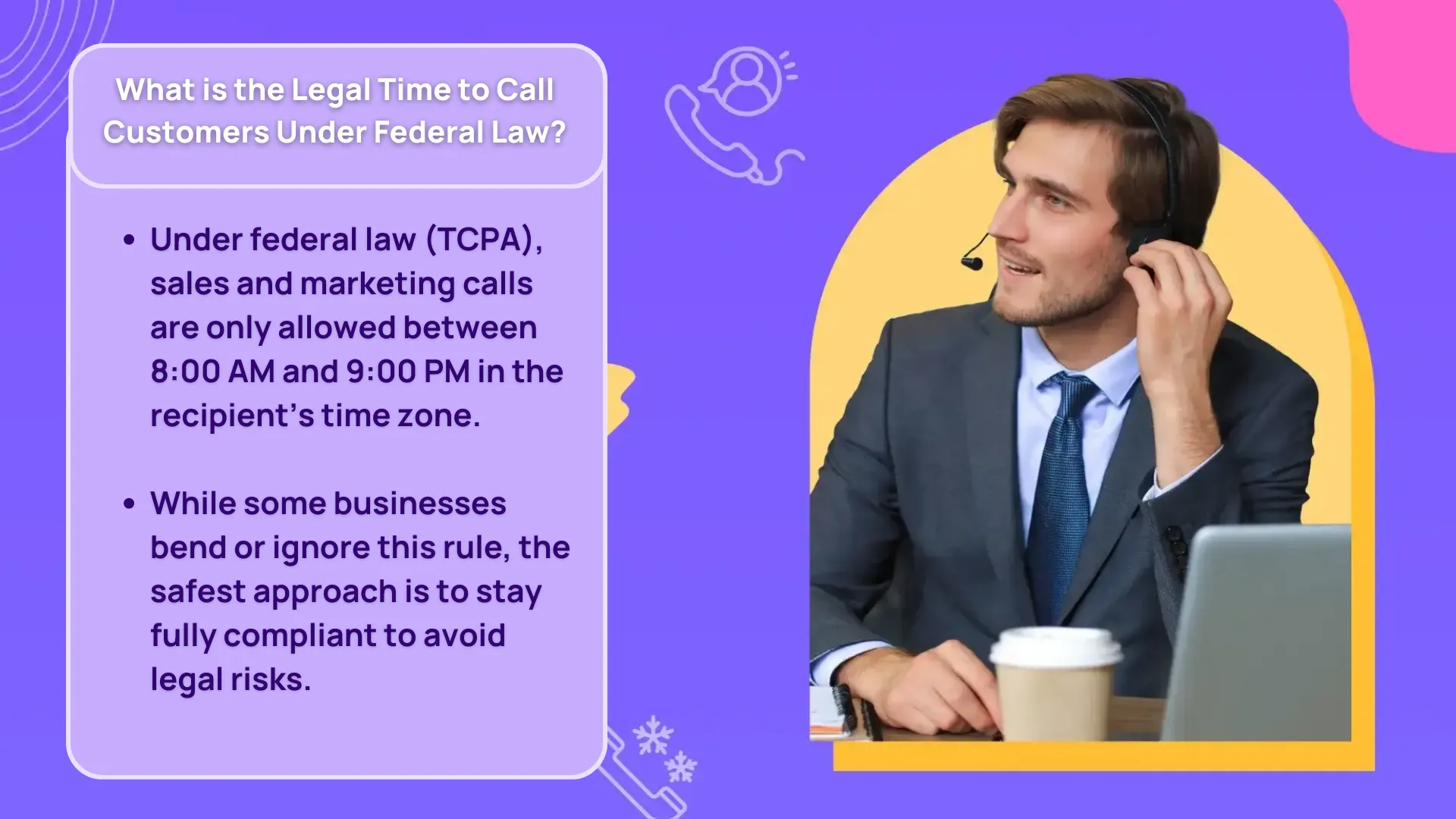
The TCPA defines a nationwide calling window: no earlier than 8:00 AM and no later than 9:00 PM in the recipient’s time zone. This standard applies to sales, marketing, and most forms of consumer outreach.
The question is, do all the outbound sales businesses, regardless of whether they operate online or in real life, follow these timings?
Well, to be honest, they don’t.
Some sales managers can allow a certain relaxation of an hour or thirty minutes for SDRs who try to reach out to prospects a little beyond the 9 PM window. Some businesses, on the other hand, do not care about timings. Maybe they operate on a different level; maybe they aren’t aware of the TCPA’s latest policies, or it could be possible that these businesses normally operate in gray and black areas.
Our recommendation is to stay compliant.
Period.
The Overall Importance of the 8 AM to 9 PM Rule: Why Is It a Big Deal In Terms of Customer Contact
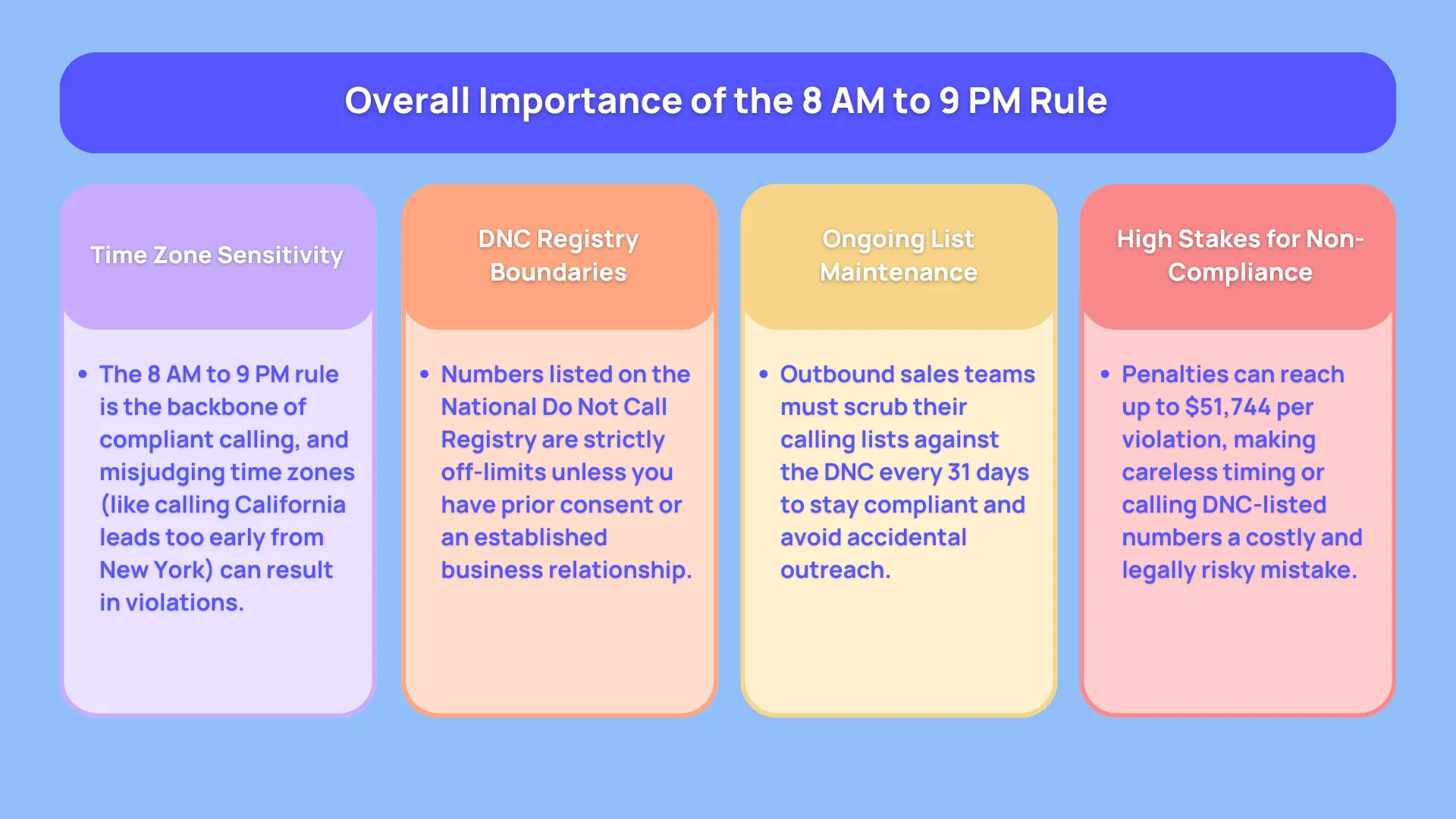
Think of this as the foundation for all calling activity.
For example, let’s say you or one of the members of your business’s SDR teams is reaching customers across multiple states; in this case, time zone awareness is crucial. Calling a California lead from New York at 8 AM Eastern could still be a violation, since it’s only 5 AM Pacific Time.
The National Do Not Call Registry Rules Explained
Furthermore, when we talk about things in the context of TCPA working hand in hand with the National Do Not Call (DNC) Registry, you need to know that any number listed in that directory is off limits. You, as an outbound sales business, are not supposed to call those numbers.
In fact, we talked about this in one of our recent posts:
How the DNC Registry Impacts Your Calling Lists and Strategy
Moving on, speaking of off-limit numbers, there are a couple of points to remember:
- Scrub your lists every 31 days against the national registry.
- Exceptions apply if you have an established business relationship or prior express consent.
- Penalties are steep—up to $51,744 per violation (as of 2025).
So, be careful who you reach out to.
Ultimately, if you are reported by several prospects, or people who received your company’s sales individual’s call at weird times, your business will not only have a hefty fine to pay, but the legal repercussions could be quite serious.
So, yes, be mindful of the approach.
And we also know for a fact that you have heard the expression: Better late than never. So, stick with it and improvise along the way for the best results.
TCPA Calling Hours Compliance: Securing Consent: The Foundation of Compliant Calling
Consent is the backbone of lawful outreach. For most manual calls, prior express consent is enough. For automated systems and texts, express written consent is required.
The question is, which factors qualify as “Valid consent”
In order for things to work and fall under the category of mutual consent, especially from the customers’ side, the following, or one of the following criteria, must be met:
- Be in writing (electronic or physical).
This means that the customer must give consent over email, or a recorded phone call, or in writing over a physical medium, that they are okay with your calling.
- Clearly authorize calls or texts from your business.
- Specify the phone number to be contacted.
- It should not be a condition of purchase.
Navigating Call Recording Laws: One-Party vs Two-Party Consent
This is where things get a little tricky from an outbound sales business perspective.
So, recording calls isn’t a surprise. We have tons of businesses, banks, and customer service platforms where it is explicitly mentioned that the call is being recorded for “quality purposes.” This is pretty much standard, unless and until the rules vary by state.
Some U.S. States only require one party’s consent (usually the caller). Others demand that all parties agree.
A State-by-State Guide to Lawful Call Recording
- One-party states: Most U.S. states, including New York and Texas.
- Two-party states: California, Florida, Pennsylvania, Washington, and a few others.
Cross-border calling means you must default to the stricter standard.
Navigating Technology-Specific Regulations in Telemarketing
What Are the Rules for Robocalls and Automated Systems?
Robocalls and autodialers are heavily restricted under the TCPA. Businesses must obtain express written consent before using them for sales or marketing.
Your Essential Autodialer Compliance Checklist
- Confirm whether your system qualifies as an autodialer under FCC definitions.
- Secure valid consent.
- Provide a clear opt-out option in every call or text.
- Identify your business at the start of the call.
We can further elaborate on it through the concept of VM drops.
Trellus has different features that enable sales reps to do VM drops on different platforms. These “drops” are also known as ringless voicemail, which drops a message without ringing the phone.
It has been challenged in multiple courts. Regulators have signaled it counts as a “call” under the TCPA. But it’s not exactly lined out as that. For now, treat it as subject to your State’s TCPA compliance. If it is explicitly mentioned that the business cannot do VM drops, then avoid doing so.
Preventing Deception: Understanding Caller ID Spoofing Penalties
The Truth in Caller ID Act bans spoofing when done with the intent to defraud, cause harm, or wrongfully obtain value. Violations can cost up to $12,000 per call. And this is just a bare minimum. Some businesses have reportedly paid the “bare minimum” fine for violating TCPA policies, to the tune of $51,000+.
Always display accurate caller ID information.
Fortunately, these days, many auto and click to call dialers, such as Trellus, come with special features that do not attempt to misrepresent a business’s contact number as something deceptive.
A Closer Look at State Laws: Telemarketing Time Restrictions by State
When State Regulations are Stricter than Federal Law
Several states go beyond the 8-to-9 federal standard.
Key Examples: California, Florida, and Other Restrictive States
- Florida: No calls before 8 AM or after 8 PM.
- California: Special restrictions for certain industries.
- Oklahoma and Washington: Have “mini-TCPA” laws with their own rules.
A table comparing federal vs. state restrictions can be a helpful compliance tool.
Best Practices for Managing Multi-State Compliance
To keep things simple, many businesses apply the strictest standard across all calls. Time zone-aware dialing software and regular consultation with compliance experts can also prevent mistakes.
Industry-Specific Guidelines for Compliant Calling
What are the Allowable Hours for Sales Calls?
For outbound sales teams, the TCPA rules apply directly. Even B2B sales calls can be impacted if they involve consumer-facing numbers. Consent obtained through lead-generation forms must be clear and documented.
Best Practices for Outbound Sales Teams
- Train staff on compliance basics.
- Track consent sources.
- Respect opt-outs immediately.
When Can Debt Collectors Legally Call? A Look at FDCPA Rules
The Fair Debt Collection Practices Act (FDCPA) adds another layer:
- Calls are restricted before 8 AM and after 9 PM.
- Collectors may not contact consumers at their workplace if told not to.
Integrating FDCPA Communication Rules for Debt Collectors
The FDCPA and TCPA overlap, meaning collectors must observe both sets of rules.
Healthcare Calling: Ensuring HIPAA Compliant Patient Communication
Healthcare providers face unique challenges. The TCPA allows some exemptions for appointment reminders and prescription notifications, but HIPAA privacy requirements still apply. Marketing messages always require express consent.
The High Cost of Non-Compliance: Customer Contact Regulations and Fines - How to Avoid TCPA Lawsuits and Costly Litigation
Violations carry statutory damages of $500 to $1,500 per call or text. Class-action lawsuits can escalate quickly.
Mitigation tips:
- Keep consent records.
- Monitor vendor practices.
- Regularly update compliance protocols.
A Review of Recent FCC Robocall Enforcement Actions in 2025
Regulators have been aggressive. In early 2025, the FCC levied multimillion-dollar penalties against firms using illegal robocalls for financial scams.
Lessons Learned from Major Fines and Penalties
Even established companies have been hit. The lesson: compliance programs must be active, not just policies on paper.
Expanding Your Reach: Navigating Cross-Border Telemarketing Laws to Canada
Canada’s Anti-Spam Legislation (CASL) is one of the toughest in the world. It applies to calls, emails, and texts sent to Canadian residents. Key requirement: express consent with strict recordkeeping.
Key Takeaways for a Compliant Calling Strategy
- Stick to the 8 AM–9 PM federal rule, and stricter state rules where they apply.
- Always secure and document consent.
- Stay updated on technology-related rules for autodialers, robocalls, and spoofing.
- Understand industry-specific regulations like FDCPA and HIPAA.
- Monitor vendors, keep records, and review compliance practices regularly.
A strong compliance strategy isn’t just about avoiding fines—it builds trust with customers and protects your brand.
Frequently Asked Questions for Outbound Sales Teams
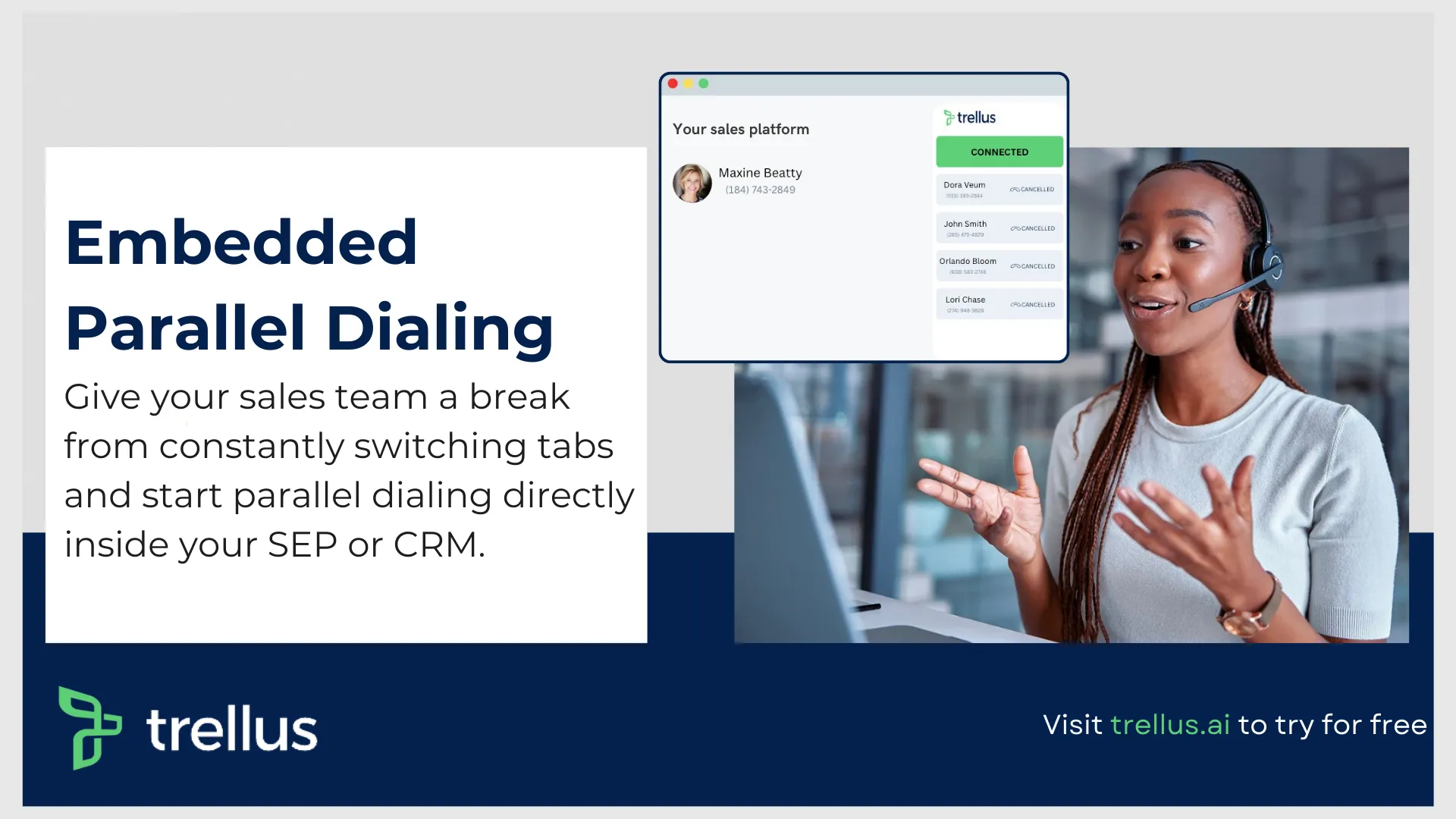
1. How do we make sure we’re not calling customers at the wrong time?
This is one of the biggest concerns for sales teams, especially when you’re working across different time zones.
The federal rule says you can only call between 8 AM and 9 PM in the customer’s local time zone—not your own. That sounds simple, but in practice, mistakes happen when leads are spread nationwide.
The easiest fix is to use time zone–aware dialing tools.
Most modern CRM and dialer platforms can automatically detect a customer’s local time based on their area code.
For extra safety, many businesses adopt the strictest state-level limits (for example, cutting calls off at 8 PM everywhere, since states like Florida require it). It might trim down your calling window a little, but it keeps your team protected from fines and complaints.
2. What if a customer gave us their number through a form—does that count as consent?
This one trips up a lot of sales teams. When someone fills out a form on your website and provides their phone number, that usually counts as implied consent for a regular manual call.
But if you’re planning to use automated dialers, prerecorded messages, or text campaigns, you’ll need express written consent. That means the person has to clearly agree—through a checkbox or digital signature—that they’re okay with receiving marketing messages from you.
The safest move is to make consent language crystal clear at the point of capture. Spell out what type of communication they’re agreeing to (calls, texts, or both).
And keep records of that consent—screenshots, timestamps, or stored form submissions. If a dispute ever comes up, having that proof on hand could save you from a lawsuit.
3. How can we avoid accidentally breaking state-specific telemarketing laws?
Federal rules give you the baseline, but state laws often add extra layers.
Florida, Oklahoma, and Washington, for example, have their own “mini-TCPA” laws with stricter rules around hours, call frequency, and even what counts as an autodialer. If you’re only familiar with the national 8-to-9 rule, it’s easy to get caught off guard.
The reality is that outbound teams don’t have time to memorize fifty sets of rules. That’s why the most practical approach is to standardize compliance at the highest level. If one state cuts calls off at 8 PM, follow that everywhere. If another requires written consent for certain calls, treat that as your default process.
Pair that with legal counsel or a compliance partner who can keep your policies updated. It’s less about memorizing every law and more about building a safe system that reduces risk across the board.



